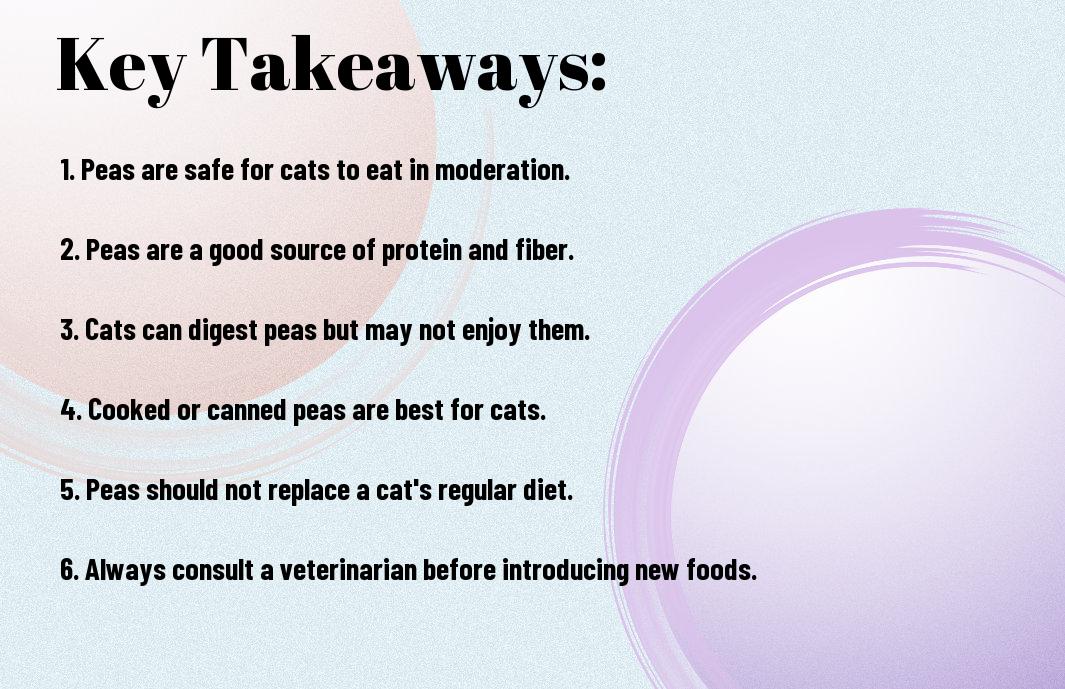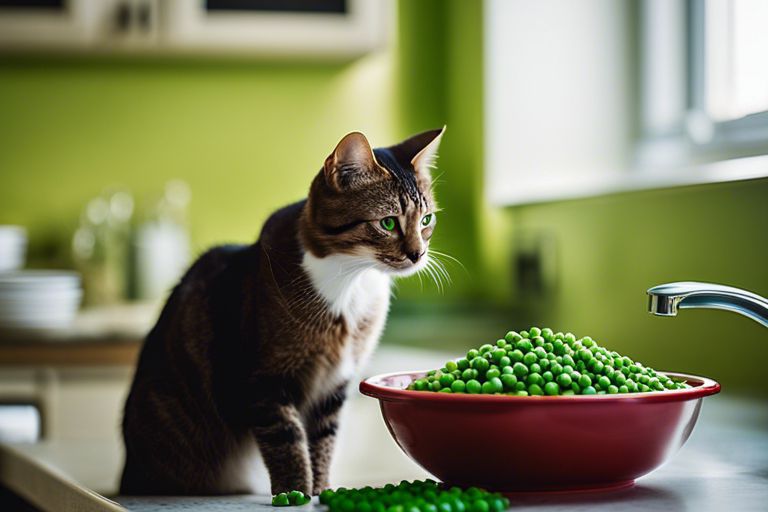Curious about whether or not your feline friend can indulge in this popular green vegetable? Peas can be a nutritious addition to your cat’s diet, but it’s important to understand the potential risks and benefits. While small amounts of cooked peas can offer fiber, vitamins, and minerals to your cat’s diet, excessive consumption can lead to digestive discomfort and potential nutritional imbalances. In this blog post, we’ll explore the safety of feeding peas to your cats, as well as provide guidelines for incorporating this vegetable into their diet in a healthy and balanced way.

Nutritional Benefits of Peas for Cats
The nutritious value of peas for cats cannot be overstated. They contain a plethora of essential vitamins, minerals, and antioxidants that contribute to a balanced feline diet. Peas are a rich source of vitamin K, vitamin B1, and vitamin C, which are vital for your cat’s overall health.
Key Nutrients Found in Peas
With high levels of fiber, peas can aid in digestive health for cats, helping to prevent constipation and regulate bowel movements. Additionally, peas are packed with antioxidants such as flavonoids and carotenoids, which can promote a strong immune system and protect against cellular damage.
The Advantage of Peas in a Cat’s Diet
Peas provide a nutrient-dense option for supplementing your cat’s diet, particularly for those with dietary restrictions or sensitivities. The high protein and low fat content of peas can also support lean muscle growth and weight management in felines.
To ensure your cat receives the full benefits of peas, it is essential to incorporate them as part of a balanced diet and consult with a veterinarian for personalized dietary recommendations.
Potential Risks and Considerations
Even though Can Cats Eat Peas? – Dutch suggests that peas can be safe for cats in moderation, there are still some potential risks and considerations to keep in mind.
Digestive Concerns and Limitations
Concerns about feeding peas to cats revolve around their digestive limitations. Cats are obligate carnivores, meaning their bodies are designed to primarily digest animal protein. While they can handle small amounts of vegetables, including peas, a diet high in peas can potentially lead to digestive issues such as bloating, gas, and diarrhea. It’s important to introduce peas slowly into your cat’s diet and monitor their digestive response carefully.
Additionally, the high carbohydrate content in peas can be a concern for overweight or diabetic cats. The extra carbs can contribute to weight gain and spike blood sugar levels, which may not be ideal for certain cats.
Allergies and Toxicity Risks
Risks of allergies and toxicity may also be a consideration when feeding peas to cats. While peas are not considered toxic to cats, some cats may have allergic reactions to peas. Symptoms of pea allergies in cats can include vomiting, diarrhea, and skin irritations. It’s essential to watch for any adverse reactions when introducing peas into your cat’s diet.
Risks of potential contamination or pesticide residue should also be taken into account. When feeding peas to your cat, it’s important to source organically grown peas to minimize the risk of exposure to harmful chemicals.
Risks of allergies, digestive issues, and potential exposure to toxins make it crucial for cat owners to carefully consider the suitability of peas in their cat’s diet. Monitoring your cat’s response to peas and consulting with a veterinarian is essential to ensure their safety and well-being.

Serving Peas to Your Cat
Not all cats are fans of vegetables, but if your cat enjoys peas, it is important to serve them in a safe and appropriate manner. Peas can offer some nutritional benefits for cats, but it is crucial to take certain precautions when including them in your feline friend’s diet.
Recommended Portions and Frequency
The recommended portions of peas for cats should be small and infrequent. The size of a pea is a good guideline for portion size, and the frequency of feeding peas to your cat should be no more than a few times a week. While peas can provide some nutritional value, they should not make up a large percentage of your cat’s diet.
Safe Preparation Methods
Frequency is important to consider when it comes to preparing peas for your cat. When offering peas to your cat, it is best to serve them cooked and mashed to prevent any choking hazards. Raw or uncooked peas can be difficult for cats to digest and may cause gastrointestinal discomfort. For instance, you can mash peas and mix them into your cat’s regular wet food to make them more palatable.
Alternative Vegetables and Supplements
Now that we’ve established that peas can be safely consumed by cats in moderation, it’s important to consider other vegetables that can provide nutritional benefits to your feline friends. In addition, we will explore when it may be necessary to consider supplements to ensure your cats are getting all the essential nutrients they need.
Other Safe Vegetables for Cats
With the understanding that cats are obligate carnivores, it’s important to provide them with sources of protein and essential nutrients. Some other safe vegetables for cats to eat include: cooked carrots, steamed asparagus, and green beans. These vegetables can provide additional fiber and nutrients to your cat’s diet, but should make up only a small portion of their overall intake.
When to Consider Supplements
Consideration should be given to adding supplements to your cat’s diet if they have specific health concerns or dietary restrictions that may prevent them from getting all the essential nutrients they need. If your cat has a medical condition that affects their ability to absorb nutrients, or if they are on a restricted diet, supplements may be necessary to ensure they are meeting their nutritional requirements.
Safe supplements for cats may include omega-3 fatty acids for skin and coat health, as well as probiotics to support digestive function. It’s important to consult with your veterinarian before adding any supplements to your cat’s diet, as excessive amounts of certain supplements can be harmful to cats.

Are Peas and Eggs Both Safe for Cats to Eat?
Yes, both peas and eggs are safe for cats to eat in moderation. Peas are a good source of vitamins and fiber for cats, while eggs provide protein and essential nutrients. When feeding your cat eggs, make sure they are fully cooked and not seasoned. Overall, cats and eggs safety is thought to be acceptable.
Summing Up: Can Cats Eat Peas? Is It Safe For My Cats?
In conclusion, while cats can eat peas in moderation, they should not make up a significant portion of their diet. Peas can offer some nutritional benefits for cats, such as fiber and protein, but they should be served in small quantities as a treat rather than a staple food. It is important to monitor your cat for any signs of digestive upset or allergies when introducing peas into their diet. Overall, while peas can be safe for cats to consume, it is best to consult with a veterinarian about the appropriate portion size and frequency for feeding peas to your feline friend.
FAQ
Can cats eat peas?
Yes, cats can eat peas in moderation. Peas are safe for cats to consume and can even provide nutritional benefits such as vitamins and fiber. However, peas should only be given to cats as an occasional treat and should not make up a significant portion of their diet.
Are peas safe for my cats?
Yes, peas are generally safe for cats to eat. They are not toxic to cats and can be a source of essential nutrients. However, it is important to ensure that the peas are cooked and not seasoned with any potentially harmful ingredients such as garlic or onions. Additionally, some cats may have digestive sensitivities to peas, so it is important to monitor your cat for any adverse reactions after feeding them peas.
Can feeding peas to my cat have any health benefits?
Yes, feeding peas to your cat can have some health benefits. Peas are a good source of vitamins, such as vitamin A and vitamin K, as well as fiber, which can aid in digestion. Peas can also be a low-calorie, nutritious treat for overweight or obese cats. However, it is important to remember that peas should be given in small quantities and should not replace the balanced nutrition provided by a high-quality cat food. Always consult with your veterinarian before making significant changes to your cat’s diet.

Hello there, I am Iftekhar Ahmed. I am the owner of Mishka & The Cat Corners. I love to explore and write on various topics about cats

